| Srl | Item |
| 1 |
ID:
112334
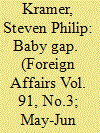

|
|
|
|
|
| Publication |
2012.
|
| Summary/Abstract |
Populations throughout the developed world are aging and shrinking, with dire consequences. Yet decline is not inevitable. Even in the industrialized world, governments can encourage childbearing through policies that let women reconcile work and family.
|
|
|
|
|
|
|
|
|
|
|
|
|
|
|
|
| 2 |
ID:
112342
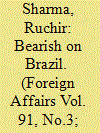

|
|
|
|
|
| Publication |
2012.
|
| Summary/Abstract |
Until recently, there seemed plenty of reasons to be bullish on Brazil. Having posted record growth for a decade and weathered the financial crisis well, the country looked poised to become a global economic leader. But the would-be giant stands on feet of clay. The economy depends too much on high commodity prices, and as demand falls, so may Brazil.
|
|
|
|
|
|
|
|
|
|
|
|
|
|
|
|
| 3 |
ID:
112339
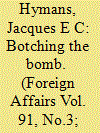

|
|
|
|
|
| Publication |
2012.
|
| Summary/Abstract |
Nuclear weapons are hard to build for managerial reasons, not technical ones. This is why so few authoritarian regimes have succeeded: they don't have the right culture or institutions. When it comes to Iran's program, then, the United States and its allies should get out of the way and let Iran's worst enemies -- its own leaders -- gum up the process on their own.
|
|
|
|
|
|
|
|
|
|
|
|
|
|
|
|
| 4 |
ID:
112337
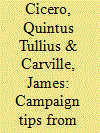

|
|
|
|
|
| Publication |
2012.
|
| Summary/Abstract |
In 64 BC, the great Roman lawyer and orator Marcus Tullius Cicero ran for consul. His younger brother, Quintus, thought Marcus had a chance -- as long as he ran a good campaign. So Quintus wrote a detailed strategy memo laying out just what Marcus needed to do to win. It's the best guide to electioneering you'll ever read, presented here with a commentary by the legendary political consultant James Carville.
|
|
|
|
|
|
|
|
|
|
|
|
|
|
|
|
| 5 |
ID:
112336
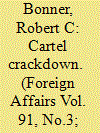

|
|
|
|
|
| Publication |
2012.
|
| Summary/Abstract |
Mexico is winning its death match against the drug cartels and rebuilding once-corrupt institutions in the process. But an election is approaching, and the candidates are calling for a truce. Mexico can take its place in the sun, but only if it wipes out the cartels for good.
|
|
|
|
|
|
|
|
|
|
|
|
|
|
|
|
| 6 |
ID:
112345


|
|
|
|
|
| Publication |
2012.
|
| Summary/Abstract |
For too long, climate diplomacy has focused on carbon dioxide. But at least 40 percent of global warming can be blamed on shorter-lived pollutants, which also cause disease and damage crops in developing states. Reining in pollution would thus accomplish two goals, while finally getting countries such as China and India into the climate-change business.
|
|
|
|
|
|
|
|
|
|
|
|
|
|
|
|
| 7 |
ID:
112347
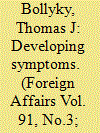

|
|
|
|
|
| Publication |
2012.
|
| Summary/Abstract |
The main health threat in developing states today is not plagues or parasites but illnesses such as cancer and diabetes, noncommunicable diseases long associated with the rich world. NCDs are striking poorer, younger populations, and this could debilitate states and the global economy. The best way for the West to help is by pushing for governance reform.
|
|
|
|
|
|
|
|
|
|
|
|
|
|
|
|
| 8 |
ID:
112340
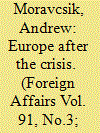

|
|
|
|
|
| Publication |
2012.
|
| Summary/Abstract |
As Europe emerges from economic crisis, a larger challenge remains: finally turning the eurozone into an optimal currency area, with economies similar enough to sustain a single monetary policy. Getting there will be difficult and expensive, but the future of European integration hangs in the balance.
|
|
|
|
|
|
|
|
|
|
|
|
|
|
|
|
| 9 |
ID:
112344


|
|
|
|
|
| Publication |
2012.
|
| Summary/Abstract |
Around the world, criminal organizations and governments are fusing to an unprecedented degree, blurring the distinction between national interests and what suits the gangsters. Mafia states enjoy the unhealthy advantages of their hybrid status: they're as nimble as gangs and as well protected as governments, and thus more dangerous than either.
|
|
|
|
|
|
|
|
|
|
|
|
|
|
|
|
| 10 |
ID:
112338


|
|
|
|
|
| Publication |
2012.
|
| Summary/Abstract |
The Obama administration's foreign policy has tried to reconcile the president's lofty vision with his innate realism and political caution. And given the domestic and global situations Obama has faced, pragmatism has dominated. Judged by the standard of protecting U.S. interests, things have worked out quite well; judged by the standard of midwifing a new global order, they remain a work in progress.
|
|
|
|
|
|
|
|
|
|
|
|
|
|
|
|
| 11 |
ID:
112346


|
|
|
|
|
| Publication |
2012.
|
| Summary/Abstract |
Proponents of renewable energy have had a hard time lately, thanks to the recession, competition from natural gas, and embarrassments such as Solyndra. But it's too early to give up, since recent advances have made wind and solar power more competitive than ever. Still, governments must redesign their policies and help renewables slash costs.
|
|
|
|
|
|
|
|
|
|
|
|
|
|
|
|
| 12 |
ID:
112341


|
|
|
|
|
| Publication |
2012.
|
| Summary/Abstract |
Most experts think the global recession was caused by a collapse in demand -- and so, in good Keynesian fashion, they want governments to ramp up spending to compensate. But the West's recent growth was dependent on borrowing. Going even further into debt now won't help; instead, countries need to address the underlying flaws in their economies.
|
|
|
|
|
|
|
|
|
|
|
|
|
|
|
|
| 13 |
ID:
112335


|
|
|
|
|
| Publication |
2012.
|
| Summary/Abstract |
With the Iraq war over and U.S. troops returning from Afghanistan, the U.S. Army faces a decade of change, writes its chief of staff. It will need to adjust to smaller budgets, focus more on Asia, and embrace a fuller range of potential missions.
|
|
|
|
|
|
|
|
|
|
|
|
|
|
|
|
| 14 |
ID:
112343
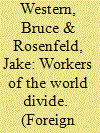

|
|
|
|
|
| Publication |
2012.
|
| Summary/Abstract |
Unions underwrote the affluence of U.S. workers in the last century. They ensured that manual work paid white-collar wages and gave laborers a voice in politics. But now, unions are declining, and the working and middle classes are paying the price. Reviving labor won't be easy -- but doing so is critical to preserving America's economic and social health.
|
|
|
|
|
|
|
|
|
|
|
|
|
|
|
|